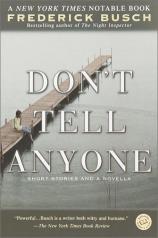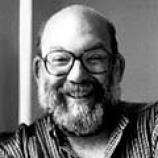Reading Group Guide
Discussion Questions
Don't Tell Anyone

1. In "Machias," the old man, Charley, tells the young couple a story of improbable heroism. Their response disappoints him, and they belatedly interpret the story as a test they have failed. What exactly is the test? Why did they fail? What point is the father trying to convey to his soon-to-marry son in relating the incident and admitting the failure? Does Charley's "test" tell you anything about how to approach stories in general?
2. Ghosts, of one sort or another, figure prominently throughout the collection. Identify the different "hauntings" in the stories. Through these various apparitions, what is Busch suggesting about the way the past works in present lives?
3. Who is the little boy in "Domicile"? Where do you think he came from? Where and why did he disappear? Can you sense his presence in any of the other stories?
4. What is the significance of the pocket knife in "Heads"? Given the history of the knife, what do you make of Alec's use of it? Does her choice of weapon affect your response to her or her actions?
5. The daughter meeting her estranged father in "The Ninth, in E Minor," realizes that "the man I had thought of as my father, looking like himself was no longer available. He was several new selves, and I would have to think of him that way." How does this understanding inform Busch's depiction of the parent-child relationships in these stories?
6. Myrna, the narrator of "Vespers," recounts an afternoon's excursion into the time-altered terrain of her childhood. She is in the company of her brother, Ira, and her lover, Bert Wagg Jr. What is the purpose of the outing? What do you make of Myrna's relationships with both men? What about how the men respond to one another in the story's beginning and then at its end? How might the story change if Ira or Bert were narrating? What has happened for Myrna by the story's conclusion?
7. Busch uses music to deepen our intuitive experience of a character's emotional state. This is especially true in "Joy of Cooking," in which two popular and happy songs--of very different origins--are sung in moments of dawning heartbreak. Think about other choices the author might have made. Why are the one he uses so effective?
8. Along the same lines, consider the choices Busch makes in other sensory details: the "cold smell of old fires" in the smokehouse in "Malvasia"; the "hot, flavorless tea" during the dinner in "Passengers"; the "little brass screw" that breaks on the eyeglasses in "Debriefing." How do these specific observations guide your experience of the story? Find other examples of the telling detail and discuss how description can serve as more than just the backdrop to narrative action.
9. Kevin, the unnerving boy who arrives unannounced on the threshold in "Bob's Your Uncle," is greeted by the said Uncle Bob with a set of polarized descriptions. In the first, Kevin is a handsome, elegantly dressed young man, but as he moves past Bob, farther into the house, those details degrade. How does Bob's reversal in perception prepare you for what is to follow? Are there other such reversals for the characters or for you, the reader? How do these help you decipher the probable content of Jillie and Deborah's unheard phone conversation?
10. "Timberline" and "Still the Same Old Story" appear physically connected. Back-to-back in the collection, both close with the narrating characters' comments on being in a story. In the first, Hank thinks, his thoughts sounding in his wife's voice, "If you don't have a story, there isn't an end. You don't get punctuation." In the second, Sharon says, "Once you are in a story, you must live forever. You must choose again and again. You always do it the same." Discuss the implications of these ideas in terms of how they reflect upon each other; what does Sharon's reasoning say for Hank's story and vice versa?
11. The novella, A Handbook for Spies, is divided into two sections, each titled from the final lines of James Wright's "To the Muse." What is accomplished by dividing the narrative and yet, bridging the division with these lines from the poem?
12. Poetry, both the subject and the form, surfaces in several places throughout the work. Given that context, what becomes of the antiwar demonstrators' reading of the names of the dead?
13. The narrative concerns, in part, the characters' differing, pragmatic strategies of getting what they need by pretending to be something they are not. Consider each of these characters and strategies in turn. Would you include Willie among them? Why or why not?
14. When Tony's husband, a Vietnam vet, assaults Willie in his campus office, it is with a rage fueled by more than sexual jealousy and humiliation. Consider the scene in the faculty club that takes place immediately before the attack. Upon leaving the club, Willie spots the ex-husband watching him. What exactly is happening in the build up to the assault? Why do the memories of his father's "just in case" chocolates and Tony's admonition to "stay away from the wine" hold importance here?
15. The next chapter, "I'll Be Home for Christmas," is almost a mirror image of the assault in several ways: Professor Wherry's presence at the faculty club, Tony's husband's concrete declaration of his claim of her body, another powerful revelation of the entrenchment of anti-Semitism. What does Busch accomplish in the dovetailing of these two scenes in this fashion? What is behind Tony's smile of triumph? How is Willie changed by the juxtaposition of these two events?
16. In the novella's second half, in the section from which the collection takes its title Don't Tell Anyone, Willie confronts his father with the fact that his attempts at a secret life failed; his mother had discovered the affair the father was trying to hide behind the lie of being a CIA operative. "His father nodded. 'Everyone always discovers,' he said. 'There are no secrets.... ultimately, all secrets are told. No. Not told: suspected.' " What then do you suspect is Willie's secret? What is "The Bracelet on the Bone"? How does the novella's final scene echo the imagery of the James Wright poem?
17. And finally, to return to the stories, "The Talking Cure" begins: "Love is unspeakable." Consider the shades of meaning in that statement. How do you reconcile what cannot be spoken with what dare not be told? Does the struggle to effect that reconciliation, in the end, give us any insight into what exactly "literary art" might be?
Don't Tell Anyone
- Publication Date: August 28, 2001
- Paperback: 336 pages
- Publisher: Ballantine Books
- ISBN-10: 0345443934
- ISBN-13: 9780345443939







